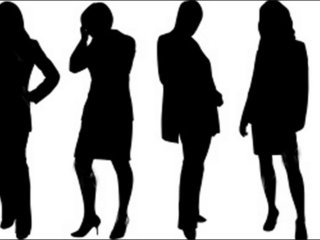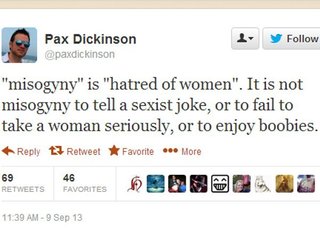
Twitter's lady problem summed up in lame flyer
The assumption of maleness isn't just Twitter's problem. It's a Silicon Valley tradition.
Twitter has a woman problem. Or, rather, Twitter’s board has a woman problem. As AllThingsD’s Kara Swisher and the New York Times have pointed out, Twitter is yet another (YET. ANOTHER.) Silicon Valley giant with zero lady board members. Over the weekend, Twitter CEO Dick Costolo found himself at the epicenter of a flurry of conversations about women in Silicon Valley—specifically a lack of women on the boards of some of the largest players in Silicon Valley.
You know what doesn’t help when you’re frantically trying to swat away accusations of sexism and discrimination in your company? Posting flyers with big-busted St. Pauli Girl cartoons on bathroom doors.

The poster was tweeted by Twitter engineering manager Jill Wetzler, who commented: "Seen on a sign in the @twoffice. In the women's bathroom no less. Think this is directed at me? #facepalm."
Several other female employees also chimed on to voice their irritation with the poster.
Let’s be clear: it’s not a hill to die on. It’s not a NO GIRLS ALLOWED EVAR sign. But it says a lot about the place of women in Twitter’s company culture.
Personally, I’ve never worked at a place where something like that would’ve flown. But that’s because I’ve never worked at male-dominated companies. At first glance, it seems harmless, silly, quirky, etc. But seeing something like this day in and day out? Yeah. I’d get the message loud and clear: I’m not part of the team.
So if we’re going to analyze a flyer for a company Oktoberfest party, the assumption is clear: if you’re an engineer, you’re a heterosexual, probably-single dude. By virtue of the poster’s mere existence, the assumption is that anyone looking at the flyer is probably a straight, single-ish dude.
Twitter’s obviously not alone in making this very simple assumption. Last month, Loopt co-founder and CEO Sam Altman casually wrote in a blog post that one of the signs that Silicon Valley is in a bubble is “hot girls roaming bars trying to chat with any guy that looks like he might be an engineer and looking for a job.” Because 1) bitches be gold diggers, and 2) software engineers are male. Der.
And therein lies Silicon Valley’s problem with women and minorities: the assumption of maleness. To explain, let me back up.
Over the weekend, Twitter came under fire for a near total absence of women on its board. Technology entrepreneur and academic Vivek Wadhwa called out Twitter and other Silicon Valley companies for their exclusion of women:
“This is the elite arrogance of the Silicon Valley mafia, the Twitter mafia. It’s the same male chauvinistic thinking. The fact that they went to the I.P.O. without a single woman on the board, how dare they?”
To which Dick Costolo replied, “Vivek Wadhwa is the Carrot Top of academic sources.”
Funny. But snotty. The total dearth of women on Silicon Valley boards is kind of a big ass problem—not just for women, but for companies and the economy as a whole. Studies have shown that the more diverse a board is, the more likely the company is to outperform market trends. So it would be nice if Dick Costolo could pretend to be concerned about this.
Costolo later explained to Wadhwa: “You’re not seeing my point. You give people an easy out by just checking a box. The issues are much bigger than checking any 1 box.”
It’s the same reason Mark Zuckerberg gave for Facebook’s absence of female board members prior to Sheryl Sandberg’s admission to the boy’s club.
“I’m going to find people who are helpful, and I don’t particularly care what gender they are or what company they are. I’m not filling the board with check boxes,” Zuckerberg told The New Yorker back in 2011.
Of course, it’s all fine and well to say “I’m gender/color/class-blind, bro,” but that doesn’t mean you are. It just means you don’t see your own biases.
And that’s the problem with the fixation on culture fit. When CEOs talk about building their team and finding people that are the right “fit in with the company culture,” what they’re really referring to is people who look and act like them.
Take, for example, this little tidbit from Max Levchin, who was a guest speaker for a Stanford Startup class in 2012:
“PayPal also had a hard time hiring women. An outsider might think that the PayPal guys bought into the stereotype that women don’t do CS. But that’s not true at all. The truth is that PayPal had trouble hiring women because PayPal was just a bunch of nerds! They never talked to women. So how were they supposed to interact with and hire them?”
Levchin went on to tell a story about a woman who interviewed for a position at PayPal. She seemed like a good bet until they realized she couldn’t code. Only—that wasn’t the reason she didn’t work out. “She was a competent manager but a cultural outsider. PayPal was a place where the younger engineers could and would sometimes wrestle with each other on the floor to solve disputes! If you didn’t get the odd mix of nerdiness + alpha maleness, you just stuck out.”
Levchin said another candidate who had aced all his engineering tests was ultimately nixed because he said he liked to shoot hoops in his free time: “That single sentence lost him the job. No PayPal people would ever have used the word ‘hoops.’ Probably no one even knew how to play ‘hoops.’ Basketball would be bad enough. But ‘hoops?’ That guy clearly wouldn’t have fit in.”
Or take this bit from Y Combinator’s Paul Graham, who told the New York Times earlier this year, “I can be tricked by anyone who looks like Mark Zuckerberg. There was a guy once who we funded who was terrible. I said: ‘How could he be bad? He looks like Zuckerberg!’”
And there you have it.
The notion that Silicon Valley’s tech world is an untainted meritocracy where the best and brightest will naturally thrive while the indolent and apathetic will fall by the wayside assumes that investors and mentors aren’t bringing any biases to the table.
Vivek Wadhwa brought up this issue in reference to Dick Costolo.
“I don’t for a moment think that [Costolo] is overtly sexist or that he deliberately discriminates. I think that he is reflecting a common behavior in Silicon Valley, where power brokers proudly tout their ‘pattern recognition’ capabilities. They believe they know a successful entrepreneur, engineer, or business executive when they see one. Sadly, the pattern is always a Mark Zuckerberg, Marc Andreessen, Jeff Bezos—or themselves. Nerdy white males.”
Related News


